Iris Lavell's Blog, page 5
January 26, 2014
Writing tip 8 - Aim High
 I am referring to the quality of the writing here.
I am referring to the quality of the writing here. To write something of length that is coherent and interesting is such a difficult thing to do that my feeling is, as writers we should aim to create the best work that we can. This means finding examples of other authors' work that inspires us. It means to read extensively, to be open to learning, and to keep developing proficiency in the craft.
So that is my little tip for this week. Aim high. Never accept second best from yourself. Once you have the first draft, work it, leave it aside, come back to it, work it some more, leave it aside, come back to it, work it some more, and don't stop until you feel really good about it.
For your opus it could take years. Years. But that's ok.
I realise this seems to contradict my last tip, but it's about alternating modes of working. I think.
Writing Prompt
Find a book or piece of writing that represents the best of the kind of work that you want to create. Read (or reread) it and take notes on how the author does what they do. Look at areas of your own work that require more, and try to apply what you have learnt.
Published on January 26, 2014 19:53
January 24, 2014
Nice Interview about Leonard Cohen
If you want to hear a really nice interview with Sylvie Simmons, Leonard Cohen's biographer, check out the RN website here and download the podcast. If you are an admirer of the work of this wonderful writer, it is well worth a listen.
Published on January 24, 2014 22:38
January 23, 2014
Another Great Blog from the Western Australian Writing Scene...

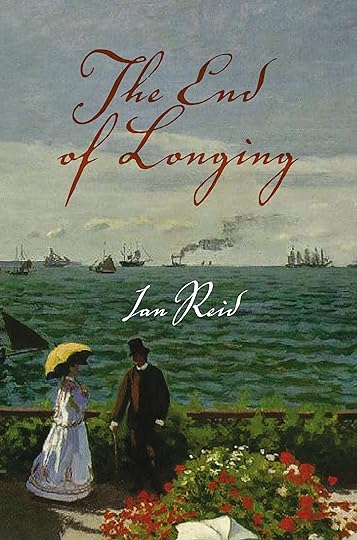
Ian Reid has recently launched a blog which reaches out to the writing community - in his own words: "where I share with you my books, literary opinions, related activities and incidental musings".
These are literary opinions and incidental musings well-worth following, I'd say. Ian has had a distinguished literary and academic career, and retains an adjunct professorial position in Humanities at the University of Western Australia.
He is the author of a dozen books (fiction, poetry, non-fiction) and editor of several more. He's written numerous literary reviews, critical essays, media articles and his writings have been have been widely published and translated into various languages.
You can read more about him at his blog-site here, but more importantly, engage in discussion around the kinds things that are of interest to those who are serious about writing .
Within the last three years Ian has had two novels published by UWAP: The End of Longing (2011) and That Untravelled World (2012).
Published on January 23, 2014 16:11
January 21, 2014
Australian Women Writers Challenge
 In the last year and a bit I read and commented on a number of books by Australian women writers but did not officially enter this challenge. Those that I read included:
In the last year and a bit I read and commented on a number of books by Australian women writers but did not officially enter this challenge. Those that I read included: Amanda Curtin - The Sinkings , Elemental
Liz Byrski - In the Company of Strangers
Deborah Burrows - A Stranger in my Street
Kathy Lette - The Boy Who Fell to Earth
Rachel Robertson - Reaching One Thousand
Maureen-Helen - Other People's Country
Trisha Kotai-Ewers - Listen to the Talk of Us
Julienne van Loon - Harmless
Hannah Kent - Burial Rites
Susan Johnson - The Broken Book
I also read Susan Swingler's House of Fiction on an Australian subject and published by Fremantle Press, so I think that almost qualifies.
For 2014 I am making a commitment to read 10 books by Australian women writers, and review at least six of these. The books I will be reading will include:
Marlish Glorie - Sea Dog Hotel, Natasha Lester - What is Left Over After, If I Should Lose You, Annabel Smith - Whiskey, Charlie, Foxtrot , Lynn Allen - Illusion , Deborah Robertson - Careless ... and others.
The reading list does not mean I will be concentrating exclusively on women writers, as 2013 included a lot of great books by blokes too, and writers from countries other than Australia, of course, but the challenge ensures that the gender skew in books reviewed in this country is shifted more towards the centre.
Reading is a great inspiration to writing. I have included links to the text mentioned above. Well worth checking out, if you haven't done so already.
Published on January 21, 2014 16:39
January 19, 2014
Writing Tip 7 – Daydream, cultivate a level of laziness, and get a good night’s sleep
 I always felt that daydreaming was an important component of creativity, but a recent program on Radio National’s All in the Mind called The Mind at Rest suggests that there is a growing body of evidence that shows how very important daydreaming and sleep is to create and to maintain a healthy mind. Not all of the time, but some of the time. And there is a growing body of evidence that certain stages of sleep appear important for the consolidation of learning and memory.
I always felt that daydreaming was an important component of creativity, but a recent program on Radio National’s All in the Mind called The Mind at Rest suggests that there is a growing body of evidence that shows how very important daydreaming and sleep is to create and to maintain a healthy mind. Not all of the time, but some of the time. And there is a growing body of evidence that certain stages of sleep appear important for the consolidation of learning and memory.So the writing tip for this week is – take time to daydream. This means, don’t work too hard! Even better, you can do some gardening or the ironing or washing-up - any activity where your hands are busy, but your mind is free to wander. Become less focussed. If you travel in a train or bus, stare out of the window instead of at your screen.
This is related to the play tip post earlier, but here I'm not suggesting that you need to use the daydream for your writing. The idea is to allow the mind to get back into a habit of daydreaming – that habit that seems so relentlessly trained out of children from the moment they enter school. Now it turns out staring into space is actually good for you. With the prevalence of activities to fill every spare moment with distraction, the gift of daydreaming is going to become increasingly rare, I think. It is up to the artists and writers to keep it alive. And the parents of young children. And the teachers...
Writing Prompt:
Try this experiment: the writing prompt for this week is to do no writing. Use the time you would normally be writing to daydream. Lie down, listen to some gentle instrumental music, and let your mind wander. Get back into the habit of make believe. If your mind wanders to your story, all the better, but don't force it. Get back into the writing next week.
Alternatively, try the two thirds, one third method. Two thirds imagining and dreaming about your story, one third writing. Use this if you don't want to leave the writing alone for a week.
Published on January 19, 2014 23:29
January 15, 2014
Gearing up for the Perth Writers Festival
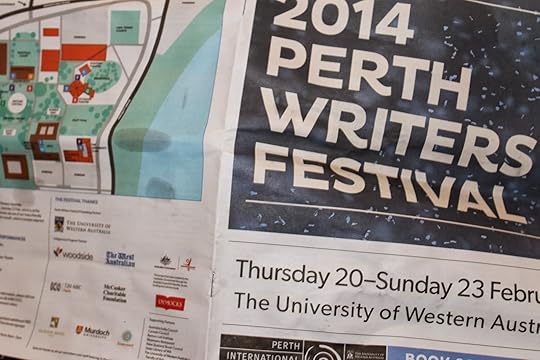 The Program for the Perth Writers Festival was launched last night at Winthrop Hall, University of Western Australia, with one of the highlights for me being the Welcome to Country - the only meaty part of the evening, apart from the skewers served afterwards.
The Program for the Perth Writers Festival was launched last night at Winthrop Hall, University of Western Australia, with one of the highlights for me being the Welcome to Country - the only meaty part of the evening, apart from the skewers served afterwards. Overall Perth Festival Director Jonothan Hollaway told the room full of readers and writers (I assume) that people still bought books because they represented optimism - the idea that they would actually get around to reading them. Seems a good cover is worth the trouble since it will at least improve the look of the bedside cabinet, even if the occupant of the bed never gets beyond page five!
There are some wonderful writers coming to the Festival - our very own (am I allowed to say that?) Amanda Curtin (Elemental, The Sinkings), the amazing writer Hannah Kent (Burial Rites), Anne Summers, William McInnes, and international stars Dame Margaret Drabble, Martin Amis, Lionel Shriver, Eleanor Catton, Philipp Meyer... the list goes on.
The company and refreshments were outstanding this year - although as designated driver I had to exercise restraint.
The Writers Festival itself starts in February on Thursday 20th and goes through until Sunday 23rd. It is absolutely packed with good stuff - the only problem will be choosing one good thing from another good thing. Much of it is free, and it is held, as always, in the beautiful grounds of the University of Western Australia.
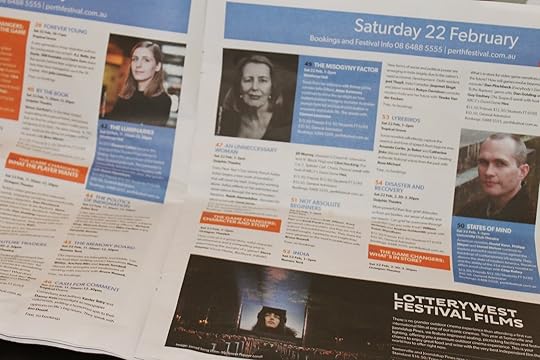
Published on January 15, 2014 18:38
January 12, 2014
Writing Tip 6 - take up activities that expand ways of seeing...
 I'm thinking here of the visual arts (painting - especially realistic subject matter, looking at the familiar in new ways, drawing, sculpting, photography), the performing arts (inhabiting another character through acting - it is worth taking some acting classes, or learning to direct a performance), or drawing on the expertise of others who undertake these activities.
I'm thinking here of the visual arts (painting - especially realistic subject matter, looking at the familiar in new ways, drawing, sculpting, photography), the performing arts (inhabiting another character through acting - it is worth taking some acting classes, or learning to direct a performance), or drawing on the expertise of others who undertake these activities. Listening, really listening to others, especially people whose perspectives are different from my own, and trying to understand things from their perspective. This can involve the temporary suspension of ego, and involves a certain amount of humility and empathy. It is not an easy thing to do because it often involves a willingness to lower personal defences, and can involve changing self-perception.
My feeling is that changing how we look at things sometimes changes what we think and believe (but not always), and can take quite a lot of courage. It puts the viewer in a liminal space, which opens up the writing to new directions.
Writers need to be courageous, and to use courage ethically - that is, there's not value in using writing to settle personal vendettas. There is value in looking at things in unconventional ways in order to further understanding.
Reading is vital, of course, reading the best of the kind of books that I might aspire to write, and the books that I don't normally read.
And books about ways of seeing. Two good ones (classics) are:
John Berger - Ways of Seeing
Roland Barthes - Camera Lucida
Writing prompt:
Go to a familiar area inside or outside your home and word-paint the scene as if you are attempting to impart the physical and sensory components to someone who is unable to see or experience it.
Published on January 12, 2014 17:29
January 8, 2014
My take on The Birdwatcher by William McInnes
 The Birdwatcher
is a story about a man of forty-something who is more than a bit of a twitcher (he watches birds and ticks them off once he has seen them). On the strength of a rumour that a PPMG (the elusive pale pygmy magpie goose) might have been spotted, or heard, he takes off from his none-too-secure job on leave-without-pay, and away from a developing relationship with a perfectly good girlfriend, to fly from Sydney to North Queensland. Ultimately what he finds is even more than he had hoped for.I was drawn to this story because of the title of the book (I’ve always been a bit of a sucker for birds, although not in classifying them) and because of this, combined with it having been written by William McInnes (I’ve always been a bit of a sucker for this prominent Australian actor since seeing him in
Look Both Ways
). William McInnes was available to sign copies of his book at the Bookcaffe in Swanbourne, so two birds, one stone – so to speak (although I have never actually approved of throwing stones at birds!).This is the first of William McInnes’s books that I’ve read, but won’t be the last. Apparently it is the seventh that he has written. While I admired his acting prowess, and knew he wrote, I hadn’t read any of his previous books. This is not to say that The Birdwatcher is a perfectly constructed book. Fortunately. There are some slow passages toward the middle but I like this because it goes some way to reflecting the situation of the characters, and supports the second half beautifully. (It also supports my hypothesis that character development as the book progresses tends to influence a novel’s structure). The second half picks up the pace and is, I think, really good. It is humorous and touching, and contains subtle human insights, and observations that seem to have been honed by virtue of the author’s life and performance experience – an understanding of people and the subtleties of body language and ways in which dramatic effect can be effectively used in the writing. This is a love story at its heart, of the natural world and of people, and a love relationship where the awkward guy gets the awkward girl. It is told with compassion, humour and intelligence. Oh, and nice writing!
The Birdwatcher
is a story about a man of forty-something who is more than a bit of a twitcher (he watches birds and ticks them off once he has seen them). On the strength of a rumour that a PPMG (the elusive pale pygmy magpie goose) might have been spotted, or heard, he takes off from his none-too-secure job on leave-without-pay, and away from a developing relationship with a perfectly good girlfriend, to fly from Sydney to North Queensland. Ultimately what he finds is even more than he had hoped for.I was drawn to this story because of the title of the book (I’ve always been a bit of a sucker for birds, although not in classifying them) and because of this, combined with it having been written by William McInnes (I’ve always been a bit of a sucker for this prominent Australian actor since seeing him in
Look Both Ways
). William McInnes was available to sign copies of his book at the Bookcaffe in Swanbourne, so two birds, one stone – so to speak (although I have never actually approved of throwing stones at birds!).This is the first of William McInnes’s books that I’ve read, but won’t be the last. Apparently it is the seventh that he has written. While I admired his acting prowess, and knew he wrote, I hadn’t read any of his previous books. This is not to say that The Birdwatcher is a perfectly constructed book. Fortunately. There are some slow passages toward the middle but I like this because it goes some way to reflecting the situation of the characters, and supports the second half beautifully. (It also supports my hypothesis that character development as the book progresses tends to influence a novel’s structure). The second half picks up the pace and is, I think, really good. It is humorous and touching, and contains subtle human insights, and observations that seem to have been honed by virtue of the author’s life and performance experience – an understanding of people and the subtleties of body language and ways in which dramatic effect can be effectively used in the writing. This is a love story at its heart, of the natural world and of people, and a love relationship where the awkward guy gets the awkward girl. It is told with compassion, humour and intelligence. Oh, and nice writing!
Published on January 08, 2014 17:18
January 5, 2014
Writing tip 5 - Stick with the process
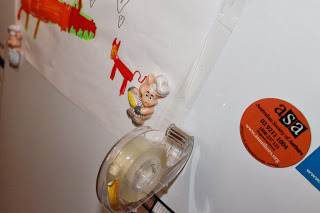 It's a roller coaster ride, isn't it? When you're at the bottom looking up at that mountain, you never think your vehicle is going to make it. As you're struggling to the top, there are so many groans and clanks, that you wonder if the brakes will hold, or whether you'll slip right back down the valley. Then just when you'd all but given up you find yourself at the top with just a few seconds to take in the magnificent view before you're flying, and... enough already with that!
It's a roller coaster ride, isn't it? When you're at the bottom looking up at that mountain, you never think your vehicle is going to make it. As you're struggling to the top, there are so many groans and clanks, that you wonder if the brakes will hold, or whether you'll slip right back down the valley. Then just when you'd all but given up you find yourself at the top with just a few seconds to take in the magnificent view before you're flying, and... enough already with that!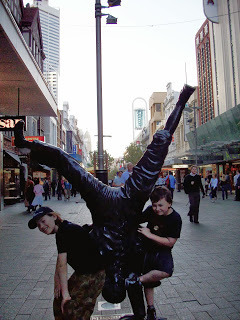
The thing is, the more ambitious the project (and that doesn't always relate to size) the more there will be these times of desperation and euphoria, interspersed with a fair bit of ho-hum along the way. Creative communication is a battle with the self.
Above all, persist. Persist in good times and in bad, because sometimes it is when the problems seem insurmountable that you really start to come up with some really interesting solutions.
Of course, there are times when you need to put the thing aside for a while - just walk away from it for a day or two, or a month or two (a year? Or two?) - and then come back and start working at it again. Come in from a new angle. Start a new scene or chapter. Cut yourself some slack.
If it is supposed to take a minimum of 10,000 hours of working at something to become an expert, then with writing the great continental or national novel, the great Australian, American, African, Indian, Chinese, European, New-Guinean, Russian, Lithuanian ... novel, it is bound to take more than a lick and a polish.
How many drafts? As many as it takes. The more experienced a writer you are, I believe the more drafts you will write. Too many sometimes, probably, but that doesn't start to happen until about the twentieth!
So persist for longer than you think you should have to. And then, at a certain point, stop persisting and move on to the next thing.
Think of it this way - even if a particular project doesn't work out as you would have wished, you will have learnt a massive amount (which, even if nothing else, will be invaluable for your opus magnum). Or think of it this way, the more you hone your work, the better it becomes and the better your chances of having it read and enjoyed.
Writing prompt
Write a new scene for your current project - a day in the life of ... a character that you have developed the least. You don't have to use it, but write it as an exploration and a way of gaining some new insights into this character.
Published on January 05, 2014 22:39
January 2, 2014
Update - Margaret River Short Story winners publication
 Glen Hunting, BLPG member who has recently had his story for this competition accepted for publication, emailed me to let me know that Kristen Levitzke, who is part of our Book Length Project network, is having her short story published in the collection,
and that she has achieved this feat for the second year running!
Glen Hunting, BLPG member who has recently had his story for this competition accepted for publication, emailed me to let me know that Kristen Levitzke, who is part of our Book Length Project network, is having her short story published in the collection,
and that she has achieved this feat for the second year running!
Well done Kristen! It is wonderful to see this quality work getting out there for the reading pleasure of others.
If you haven't had a chance to check out the publication, follow this link here. The next one with Glen and Kristen's new stories will be out in due course. Will let you know when the anthology surfaces.
Published on January 02, 2014 16:28
Iris Lavell's Blog
- Iris Lavell's profile
- 3 followers
Iris Lavell isn't a Goodreads Author
(yet),
but they
do have a blog,
so here are some recent posts imported from
their feed.



